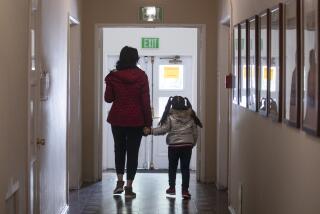Vigil Aims to Light Path Away From Domestic Violence
OXNARD — Bundled up in heavy coats against a cold wind, the women sparked their candles Wednesday night and embarked on a procession to a nearby church. It didn’t matter that the march was short--or that their numbers were small.
For the dozens of women who took part in the candlelight vigil through Oxnard’s La Colonia barrio to support victims of domestic violence, the message was the most important thing.
“We want to tell these women that they are not alone, that they have a right to live without violence in their lives,” said Maria Luisa Alvarez, a former strawberry worker who heads the Ventura County chapter of the Farmworker Women’s Leadership Project, which sponsored the event.
“There are many women who live in fear,” she said. “We want to reach their hearts so that they will know that there is a better way to live.”
Similar events have been staged across Ventura County over the past month to commemorate National Domestic Violence Awareness Month.
From a seminar at Moorpark College on domestic violence issues to a workshop on abuse in the Latino community held at Community Memorial Hospital in Ventura, law enforcement officials and victims’ advocates have teamed up this month to draw attention to what has become one of society’s most chronic problems.
In Ventura County, that problem has become readily apparent.
Domestic violence calls to law enforcement agencies more than doubled between 1990 and 1997, from 2,733 to 5,816, authorities said.
At the same time, agencies dedicated to supporting victims of abuse through shelters and crisis hotlines have experienced skyrocketing caseloads in recent years.
“There is not enough attention focused on this situation,” said Angela Lawson, a spokeswoman for the Ventura-based Coalition to End Domestic and Sexual Violence. “These types of events are really important to bring attention to the agencies that are there to help.”
Although domestic violence affects women of all races and economic levels, some populations are more vulnerable than others.
Poor women who lack education and have little knowledge of programs aimed at ending the cycle of domestic violence are particularly susceptible to ongoing abuse, victims advocates say.
“As a general rule, battered women are already isolated and afraid,” said Eileen McCarthy, an attorney with the farm worker advocacy group California Rural Legal Assistance, who took part in Wednesday night’s procession.
“Farm worker women who are victims of domestic violence are particularly vulnerable in that they face societal barriers of race, class, language, education and immigration status,” she said. “That’s why there needs to be specific types of outreach for this population.”
That is what the local chapter of the Farmworker Women’s Leadership Project sought to do Wednesday night.
It is the second year in a row that a candlelight procession and vigil have been sponsored by the leadership project in a statewide effort to teach female field laborers how to make changes in the workplace and in their communities.
Several of those who took part were farm workers.
Angelica Quintino said she was abused by her husband for several years before she got up the courage to leave.
Born in Mexico and married when she was 17 years old, the 36-year-old Quintino said that her husband used to tell her that she would lose her status as a legal immigrant if she ever left. But when a new law was passed extending permanent legal status to immigrant farm workers, Quintino seized the opportunity.
She left her husband two years ago. She said other women can do the same.
“It was a very sad life,” said the mother of four, who carried a homemade banner symbolizing her experience as a battered wife and her eventual escape from violence. “I’m here to support women who are in the situation I was in.”
Alvarez knows well the situation. She too was battered. And she also managed to escape.
Holding a white candle, its flame licked by the cold wind and spraying tiny ribbons of colored light, she said the procession and vigil were important to show other women there is a way out.
“Many women in my situation don’t know who to turn to. They don’t have an education or know English or even know how to drive,” she said. “We are here to tell them they are not alone, there is help and that they can do it.”
More to Read
Sign up for Essential California
The most important California stories and recommendations in your inbox every morning.
You may occasionally receive promotional content from the Los Angeles Times.








